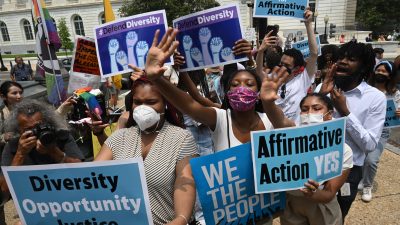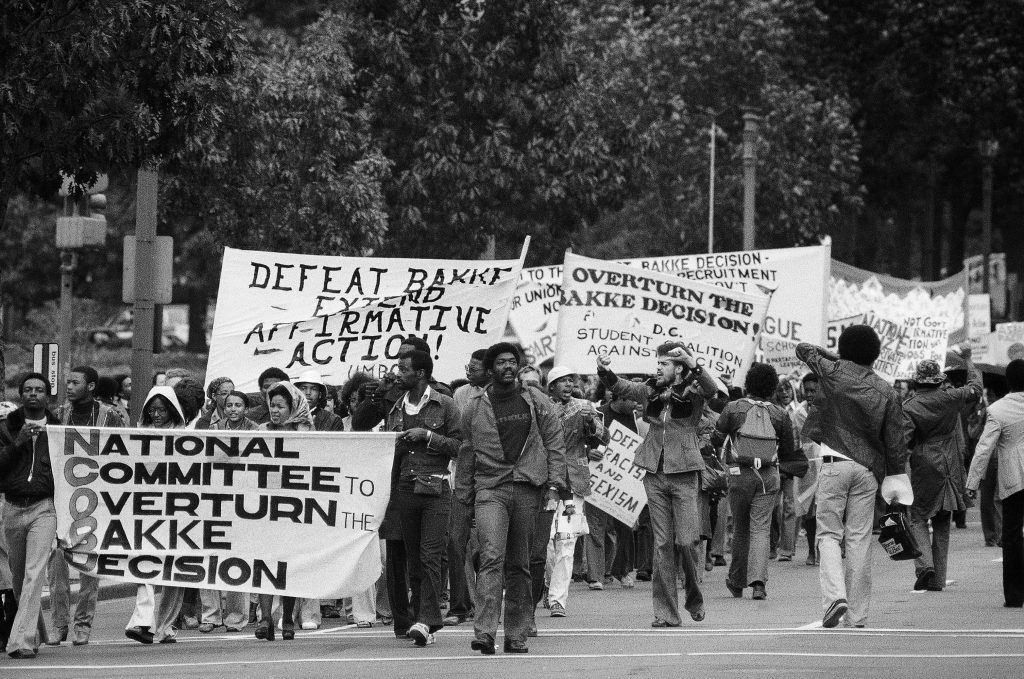Supreme Court Slams Door on Affirmative Action in Higher Education
This ruling represents a continuation of the consistent erosion of the gains made during the Civil Rights and Black Power eras

All Global Research articles can be read in 51 languages by activating the Translate Website button below the author’s name.
To receive Global Research’s Daily Newsletter (selected articles), click here.
Click the share button above to email/forward this article to your friends and colleagues. Follow us on Instagram and Twitter and subscribe to our Telegram Channel. Feel free to repost and share widely Global Research articles.
***
In a 6-3 decision, the United States Supreme Court eradicated any legal basis for the targeted admission of African Americans and other national minorities in higher educational institutions.
The ruling, which is specifically related to the consideration of racial discrimination and the need for a multicultural social environment on university campuses, has far broader implications as it relates to the struggle to overcome the legacies of enslavement, forced removals, legalized and de facto segregation, and economic exploitation.
This case was brought by a group calling itself Students for Fair Admissions, Inc., which filed a lawsuit against the President and Fellows of Harvard College claiming their affirmative action policies were unjustified and violated the Constitution. All six of the Republican-appointed justices voted with the plaintiffs saying in essence that there is no longer a need for race-conscious admissions policies in colleges and universities.
A similar lawsuit involving the University of North Carolina was combined with the Harvard case in the ruling. North Carolina was one of the Confederate states which succeeded from the U.S. during the Civil War of 1861-65. The state has been a bastion of institutional racism against African Americans since the post-Reconstruction period during the late 19th century.
Conservatives have appropriated the notion of a “color blind” country in the aftermath of the reforms adopted between the 1950s and the 1970s which were a direct outcome of the mass and legal struggles against Jim Crow led by African Americans. It was the forces for civil rights which emphasized the necessity of overturning the judicial decisions made by the Supreme Court from the mid-1870s through the Plessy v. Ferguson (1896) case where the doctrine of “separate but equal” was enshrined in U.S. constitutional law.
While the racially separate part of the Plessy v. Ferguson ruling was faithfully upheld in law and practice, there was then, and even now, no compulsion towards equality for the African American people. Within the field of education from K-12 to colleges and universities, a system of inequality and exclusion prevailed.
It would be the historic Brown v. Topeka Board of Education ruling of 1954 which culminated a decades-long legal and political movement to end inequality in the U.S. The efforts aimed at achieving equality of access and admission in education paralleled the struggles to take down the “white only” signs on businesses and other forms of public accommodations.
Justice Ketanji Brown Jackson, an African American woman appointed to the Supreme Court, in her dissent challenged the false claims of the U.S. being a “color blind” nation. Justice Jackson wrote:
“This contention blinks both history and reality in ways too numerous to count. But the response is simple: Our country has never been colorblind. Given the lengthy history of state-sponsored race-based preferences in America, to say that anyone is now victimized if a college considers whether that legacy of discrimination has unequally advantaged its applicants fails to acknowledge the well-documented ‘intergenerational transmission of inequality’ that still plagues our citizenry. It is that inequality that admissions programs such as UNC’s help to address to the benefit of us all. Because the majority’s judgment stunts that progress without any basis in law, history, logic, or justice, I dissent.” (file:///C:/Users/panaf/Downloads/Jackson-dissent.pdf)
To the extent that there is equality and self-determination for the oppressed in the U.S. is by far largely due to the mass struggles of the oppressed and their allies. As it was necessary for the U.S. to have a Civil War in order to end involuntary servitude, millions were then forced to demonstrate and rebel at the risk of social ostracism, imprisonment and death to secure any semblance of fundamental rights.
Affirmative Action and the Struggle for Freedom and Equality
Affirmative Action as a governmental policy was raised in an address by then President Lyndon B. Johnson during a graduation commencement at Howard University on June 4, 1965. Johnson would later that summer on August 6 sign into law the Voting Rights Act of 1965. Prior to the late 1960s, many efforts designed to integrate workforces, educational institutions and businesses were carried out on a token basis.
There were no timetables and specific goals established to break down the historical discrimination which characterized all aspects of U.S. society. There was the passage of the Civil Rights Act of 1964, yet it would take more rigorous measures to ensure that employers actually hired and promoted African Americans, Latin Americans, women and other oppressed and marginalized groups.
Johnson in his speech at Howard, an historic Black University in Washington, D.C., noted that:
“But freedom is not enough. You do not wipe away the scars of centuries by saying now you are free to go where you want, and do as you desire, and choose the leaders you please.
You do not take a person who, for years, has been hobbled by chains and liberate him, bring him up to the starting line of a race and then say, ‘you are free to compete with all the others,’ and still justly believe that you have been completely fair.
Thus, it is not enough just to open the gates of opportunity. All our citizens must have the ability to walk through those gates.
This is the next and the more profound stage of the battle for civil rights. We seek not just freedom but opportunity. We seek not just legal equity but human ability, not just equality as a right and a theory but equality as a fact and equality as a result.”
However, the Johnson administration was not able to implement its civil rights agenda because the demands of the masses of African Americans had outstripped the willingness and capacity of the federal government to act. Just five days after the signing of the Voting Rights Act of 1965, the people of the Watts section of Los Angeles rose in rebellion for several days, representing the largest of such occurrences in U.S. history.
Urban rebellions became a major source of protest by African Americans between 1963-1970 as over 200 cities were hit by widespread property destruction, arson and armed confrontations with law-enforcement and military personnel. Although the official narratives related to civil rights and affirmative action disproportionately credit White House administrations, Congressional bills and local ordinances for the enactment of recruitment and hiring programs, it was the self-directed efforts of the African American people which won the right to enter many jobs categories and educational structures.
A Civil Rights Bill for 1966 failed in Congress in part due to the advent of the Black Power Movement and the urban rebellions. Under the guise of not wanting to reward “rioters”, the Congress and White House moved towards a period of “benign neglect”, where the problems of the African American people were considered beyond the scope of the federal government to effectively address.
The Counterrevolution Strikes Back
Since the 1970s, there have been a host of judicial rulings and legislation adopted which have eroded the gains granted as concessions during the early phases of the Civil Rights and Black Power Movements. The famous Bakke Decision of 1978 ostensibly preserved affirmative action notwithstanding the elimination of quotas. Without specific numerical goals such as quotas, there is no guarantee that full equality in education and labor can be realized.
Demonstration against Bakke v. Calif, 1978 (Source: Abayomi Azikiwe)
A decade ago in 2013, the Shelby County v. Holder ruling of the Supreme Court eviscerated the enforcement provisions of the Voting Rights Act of 1965. Since that time period, there have been continued attacks on the right to vote for oppressed peoples. Supporters of former President Donald Trump, who were encouraged by their leaders, campaigned after the 2020 elections to nullify tens of millions of ballots cast by African Americans and other People of Color Communities in order to secure another term for the Republican candidate.
A recent article published by the St. Louis American asked the question:
“Will this ruling extend outside the halls of academia and affect businesses and other institutions influenced by race-based policies? Already Missouri Attorney General Andrew Bailey has announced that the Supreme Court decision should extend beyond college admissions saying that ‘Institutions subject to the U.S. Constitution or Title VI must immediately cease their practice of using race-based standards to make decisions about things like admissions, scholarships, programs, and employment.’”
These decisions made by the Supreme Court will only aggravate the existing inequalities between the races. African Americans may intensify their struggle to reclaim lost employment and educational guarantees.
At the same time, the further alienation of oppressed peoples and their allies could serve as a means for deeper analysis and political action against the entire capitalist system. Eventually, there has to be a clash of interests involving those seeking to reverse the progressive trends within the U.S. and the emerging majority of oppressed and working people committed to winning total freedom and social emancipation.
*
Note to readers: Please click the share button above. Follow us on Instagram and Twitter and subscribe to our Telegram Channel. Feel free to repost and share widely Global Research articles.
Abayomi Azikiwe is the editor of the Pan-African News Wire. He is a regular contributor to Global Research.
Featured image: African Americans led demonstration in support of affirmative action (Source: Abayomi Azikiwe)


